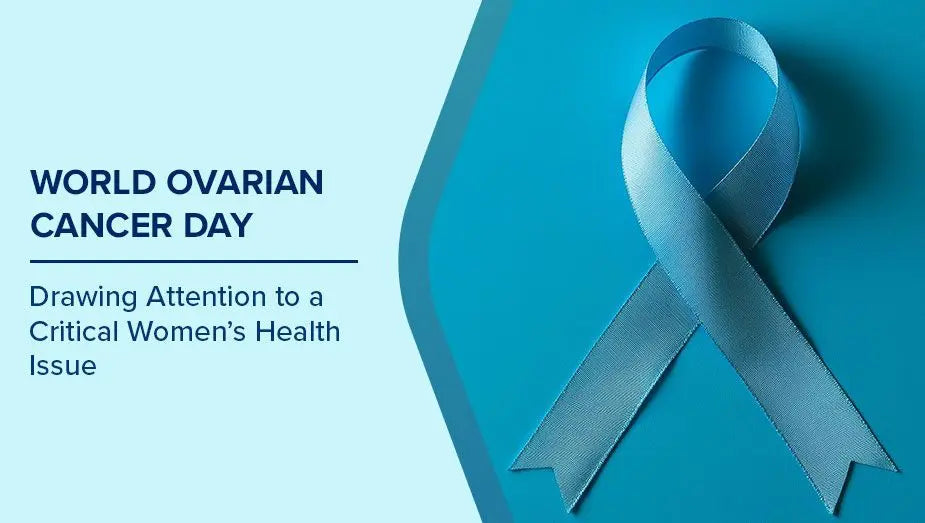
How to Fight Against Ovarian Cancer | Early Detection can Save You
Sakshi GargShare
When we talk about women’s health, conversations often revolve around breast cancer, PCOS, or menstrual health. Yet, one silent condition continues to remain in the shadows: ovarian cancer. Often called the “silent killer,” ovarian cancer is not discussed enough, diagnosed late, or misunderstood.
This blog is a sincere attempt to shed light on what ovarian cancer is, what the risk factors are, why awareness matters, and how early detection can save lives. If you’ve stumbled upon this page, maybe you’re worried for yourself, maybe for someone you love, or maybe you simply want to understand more. Whatever the reason, you’re in the right place, and hopefully at the right time!

What is Ovarian Cancer?
Ovarian cancer begins in the ovaries—the small organs on either side of the uterus responsible for producing eggs and hormones like estrogen and progesterone. It occurs when cells in or around the ovaries start to grow uncontrollably, forming a tumor that can spread to other parts of the body.
There are three main types of ovarian cancer:
-
Epithelial ovarian cancer – begins in the thin tissue covering the outside of the ovary (most common).
-
Stromal tumors – start in hormone-producing cells.
-
Germ cell tumors – rare, usually affect younger women.
While the medical terms may sound intimidating, what matters most is knowing this: ovarian cancer is treatable if caught early. The challenge is that most cases are diagnosed late because the symptoms are vague or ignored.
Why is Ovarian Cancer Called the “Silent Killer”?
The tragedy of ovarian cancer lies in its subtle symptoms. Unlike breast cancer, which often presents a lump, ovarian cancer symptoms can feel like everyday discomforts: bloating, fatigue, or changes in bathroom habits. This makes it difficult for women (and doctors) to recognize early on.
Some common early signs include:
-
Persistent bloating or swelling in the abdomen
-
Pelvic or abdominal pain
-
Feeling full quickly while eating
-
Frequent or urgent urination
-
Changes in bowel habits
These may sound like things you experience during PMS, menopause, or even indigestion. That’s why awareness is key. If these symptoms occur often and persist for more than a few weeks, it’s important to consult a doctor.
Also Read- A Guide to understanding PCOD vs PCOS

Risk Factors of Ovarian Cancer
While anyone with ovaries can develop ovarian cancer, certain factors may increase the risk. Understanding them helps you take preventive steps.
1. Age
Ovarian cancer is more common in women above 50, though it can occur at any age.
2. Family History
If your mother, sister, or daughter has had ovarian or breast cancer, your risk may be higher. Mutations in BRCA1 and BRCA2 genes play a major role.
3. Reproductive History
-
Women who have never been pregnant may have a slightly higher risk.
-
Early menstruation (before age 12) or late menopause (after 55) increases exposure to estrogen, raising risk.
4. Lifestyle and Other Factors
-
Obesity
-
Smoking
-
Hormone replacement therapy (HRT)
-
Endometriosis
Important: Having one or more risk factors does not mean you will definitely develop ovarian cancer. It only means you should stay more vigilant with regular check-ups.
The Importance of Awareness
In India, thousands of women are diagnosed with ovarian cancer every year, often at advanced stages. Many delay visiting doctors due to stigma, lack of awareness, or mistaking symptoms for minor issues.
Awareness can:
-
Encourage women to listen to their bodies.
-
Help families support timely medical consultations.
-
Push for better health policies and screenings.
Think of awareness as the first step in saving a life. Sharing information, encouraging regular check-ups, and breaking taboos around gynecological health can change the narrative.
Early Detection: The Game-Changer
Detecting ovarian cancer early is life-saving. When caught in Stage I, the survival rate is over 90%. Sadly, most cases are diagnosed in later stages where survival rates drop significantly.
How can early detection be done?
-
Regular pelvic exams: Annual check-ups with your gynecologist.
-
Ultrasound (Transvaginal): Helps visualize ovaries for abnormalities.
-
CA-125 blood test: Measures a protein that may be higher in ovarian cancer patients.
-
Genetic testing: If you have a strong family history, BRCA gene testing can be valuable.
Must Read - Cervical Cancer can be prevented. Here's How
Note: No single test is 100% reliable. A combination of regular check-ups, listening to symptoms, and open conversations with your doctor is the best way forward.
Prevention: Small Steps, Big Impact
While not all ovarian cancers can be prevented, certain steps can lower risk:
-
Healthy lifestyle – Balanced diet, regular exercise, and avoiding smoking.
-
Prophylactic surgery – For high-risk women (with BRCA mutations), removal of ovaries after childbearing years can be an option—always under medical guidance.
Prevention isn’t always about eliminating risk, but about reducing it wherever possible.
Why Ovarian Cancer Awareness Month Matters
Every September, the world observes Ovarian Cancer Awareness Month. Teal ribbons, survivor stories, fundraising marathons, and community events shine a light on this disease. But awareness shouldn’t be seasonal. It should be part of everyday conversations—just like breast self-exams and pap smears are.
By spreading awareness, we:
-
Empower women to demand better healthcare.
-
Educate communities.
-
Inspire more research funding.
Final Thoughts: Let’s Break the Silence
Ovarian cancer may be called the silent killer, but our voices don’t have to be silent. In 2025 and beyond, let’s change the narrative:
-
Let’s normalize gynecological check-ups.
-
Let’s ask doctors questions without hesitation.
-
Let’s support every woman fighting this battle with compassion.
If you’ve read this far, take one action today: talk to a loved one about ovarian cancer. Awareness spreads one conversation at a time.
Because early detection doesn’t just save lives—it gives back time, love, and moments that every woman deserves.








